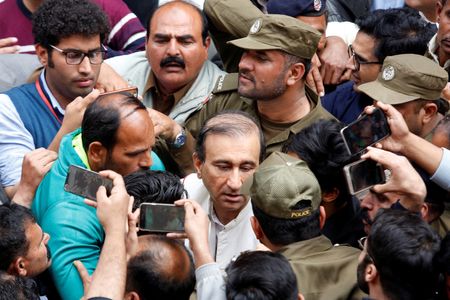By Mubasher Bukhari
LAHORE, Pakistan (Reuters) – A Pakistani court on Monday acquitted the country’s biggest media mogul of corruption charges over land acquisitions dating back three decades, a case that rights groups said was brought in an effort to curb press freedom.
After an almost two-year trial, the court in the eastern city of Lahore ordered the release of Mir Shakil-ur-Rehman for lack of evidence, his lawyer Amjad Pervaiz said.
“There is no supportive material with the prosecution to prove involvement of the accused,” the court said in its ruling.
Arrested in March 2020 on charges of securing illegal property concessions from a previous government in 1986, Rehman was granted bail later in November that year.
Rehman is the owner and editor-in-chief of Jang media group, which publishes Urdu- and English-language newspapers and also runs the popular Geo News TV.
New York-based Community to Protect Journalists (CPJ) and other rights groups said the prosecution of Rehman amounted to an attack on press freedom.
“It is the price you pay for taking an independent stance,” Geo TV Director News Rana Jawad told Reuters. He said Rehman was targeted to silence his group’s critical reporting of the government.
In its latest annual report released earlier this month, Human Rights Watch said Pakistani authorities had expanded a crackdown on journalists and dissent on the part of citizens and opposition politician, a charge the government denies.
Prime Minister Imran Khan has long accused Rehman’s media group of siding with his main rival, former two-time prime minister Nawaz Sharif.
Khan’s relations with the media have become increasingly strained since he took office after an election in 2018.
Opponents say he rode to power on the back of a crackdown on the media and his opponents by Pakistan’s powerful military, which has a history of involvement in politics, a charge both the government and the military deny.
Activists say the media crackdown since 2018 has left over 3,000 journalists and other media workers jobless.
(Writing by Asif Shahzad; Editing by Mark Heinrich)









